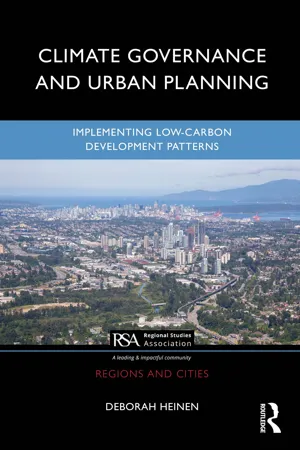
Climate Governance and Urban Planning
Implementing Low-Carbon Development Patterns
- 228 pages
- English
- ePUB (mobile friendly)
- Available on iOS & Android
About this book
Urban planning as a discipline is deeply integral to implementing a low-carbon future. This book fosters an understanding for how the rules-in-use that govern urban planning influence the ability to implement low-carbon development patterns. Drawing on the theoretical foundations of the climate governance and urban planning literatures, the book provides a context to understand plan implementation challenges and obstacles in metropolitan areas.
As metropolitan regions across the globe seek to reduce emissions from transportation, many levels of governments have developed ambitious climate action plans that make land use and transportation recommendations in order to reduce vehicle miles traveled. Many have recommended low-carbon development patterns which are characterized by intensified and diversified uses around rapid transit stations. However, the implementation of these recommendations is done within the context of different "rules-in-use" unique to the planning systems in each metropolitan region. The book examines the rules-in-use in three metropolitan regions of similar demographic size: the Metro Vancouver, Puget Sound, and the Stuttgart regions. By examining the implementation of low-carbon development patterns, the book focuses on growth management related questions about how to coordinate transit investments with land use decisions in metropolitan regions. The book finds that state legislation that deals with metropolitan planning and regional growth strategies can greatly aid in creating accountability among actors as well as provide a road map to navigate conflicts when implementing low-carbon development patterns.
By focusing on the rules-in-use, the book is of interest to policy-makers, planners, advocates, and researchers who wish to assess and improve the odds of implementing low-carbon development patterns in a metropolitan region.
Tools to learn more effectively

Saving Books

Keyword Search

Annotating Text

Listen to it instead
Information
Table of contents
- Cover
- Half Title
- Series Page
- Title Page
- Copyright Page
- Copyright Page
- Table of Contents
- List of figures
- List of tables
- Author’s biography
- Acknowledgments
- Acronyms and abbreviations
- Introduction
- 1 Promoting low-carbon development patterns
- 2 Facing a metropolitan governance challenge
- 3 Understanding rules-in-use as an implementation factor
- 4 Aligning plans in the Metro Vancouver region
- 5 Ensuring plan consistency in the Puget Sound region
- 6 Nesting plans in the Stuttgart region
- 7 Reflecting on spatial policies as rules-in-use in regional growth strategies
- 8 Integrating mechanisms support implementation
- 9 Implementing low-carbon development patterns
Frequently asked questions
- Essential is ideal for learners and professionals who enjoy exploring a wide range of subjects. Access the Essential Library with 800,000+ trusted titles and best-sellers across business, personal growth, and the humanities. Includes unlimited reading time and Standard Read Aloud voice.
- Complete: Perfect for advanced learners and researchers needing full, unrestricted access. Unlock 1.4M+ books across hundreds of subjects, including academic and specialized titles. The Complete Plan also includes advanced features like Premium Read Aloud and Research Assistant.
Please note we cannot support devices running on iOS 13 and Android 7 or earlier. Learn more about using the app